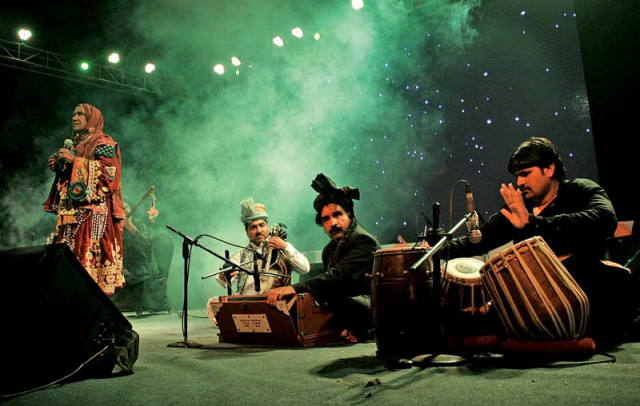‘Borderland Cultures’: Side-effects of war discussed
A foreign journalist covering the war was confused since he figured nothing but rubble would remain after the conflict

Zarsanga musical band perform at ‘A Celebration of Pushto music’ as part of the Caravanserai – Kabul in Karachi festival at Beach Luxury hotel on Saturday. PHOTO: ATHAR KHAN/EXPRESS
In the aftermath of 9/11, when the US-led coalition decided to strike Jalalabad, the capital of Afghanistan’s Nangarhar province, natives held a jirga to mark boundaries of their properties.
A foreign journalist covering the war was confused since he figured nothing but rubble would remain after the conflict ended.
He was, however, informed that this was done because residents will then be able to claim the leftover weapons, knocked-down helicopters, tanks and whatever scrap is found on their properties.
This story, narrated by The Express Tribune’s Peshawar correspondent Iftikhar Firdous during a session titled ‘Borderland Cultures’ on the last day of Caravanserai — Kabul in Karachi conference at the Beach Luxury hotel, gives a glimpse of war economies.
Discussing the plight of locals, moderator Mahvish Ahmed asked the panel, comprising researchers Safoora Arbab, Usman Shah and Firdous, about problems faced by people living along the frontier when the Pakistan Army launched operations against the Taliban in their areas.
Firdous said these people possessed both Pakistani and Afghan nationalities, which becomes a problem when they relocate.
Ahmed added that the problems of the displaced multiply when they are barred from entering cities or served eviction notices, like has happened in Karachi and Islamabad.
Published in The Express Tribune, March 28th, 2016.


















COMMENTS
Comments are moderated and generally will be posted if they are on-topic and not abusive.
For more information, please see our Comments FAQ